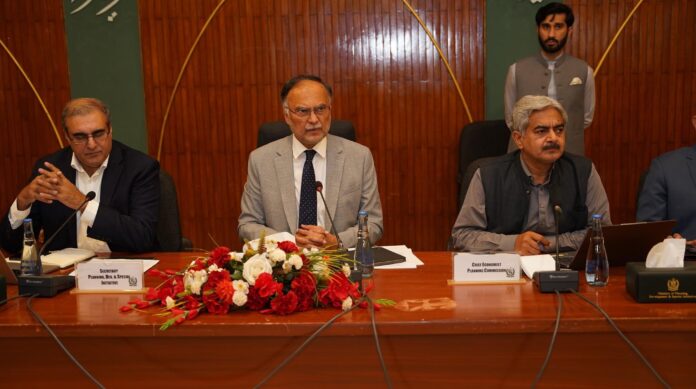The Central Development Working Party (CDWP) has approved 12 development projects worth Rs35.4 billion — including key upgrades for Pakistan Railways’ Mainline-1 (ML-1) — and referred six major schemes amounting to Rs280.2 billion to the Executive Committee of the National Economic Council (ECNEC) for approval.
The meeting, chaired by Federal Minister for Planning, Development, and Special Initiatives Ahsan Iqbal, reviewed 18 projects across multiple sectors including agriculture, health, education, governance, energy, water, and transport. Addressing the session, the minister said, “Development is not just about projects; it is about people, performance, and purpose. Every initiative we approve today must translate into a better tomorrow for Pakistan.”
He reiterated that Pakistan’s long-term development strategy is guided by Vision 2025 and the “Uraan Pakistan” 5Es Framework — focusing on Exports, E-Pakistan, Energy & Infrastructure, Environment, and Equity & Empowerment — aimed at transforming the country into a competitive, inclusive, and knowledge-based economy by 2047.
Among the key transport sector projects, the CDWP approved the Detailed Engineering Design for the ML-1 Rohri–Khanpur–Multan Section, amounting to Rs3.21 billion, with financing support from the Asian Development Bank (ADB). It also referred the Preliminary Design and Drawings for ML-1 and the Havelian Dry Port, worth Rs16.26 billion, to ECNEC for final consideration. Ahsan Iqbal called the ML-1 modernization “Pakistan’s leap into the 21st century,” emphasizing that while the world is moving toward electric trains, Pakistan must upgrade its rail infrastructure to remain competitive.
The planning minister also directed Pakistan Railways to implement a business plan and commercialize its land assets to help finance infrastructure upgrades, ensuring long-term sustainability.
Under the agriculture and food security agenda, the Punjab Resilient and Inclusive Agriculture Transformation (PRIAT) Project worth Rs68.67 billion was referred to ECNEC. Iqbal emphasized aligning the project with measurable outcomes and past cluster-based studies to enhance value addition and export competitiveness. The Punjab Climate Resilient and Low Carbon Agriculture Mechanization Project (P-CLAMP), worth Rs36.12 billion and financed by ADB, was also referred to ECNEC.
Additionally, the CDWP approved the National Programme for Animal Disease Surveillance and Control worth Rs7.35 billion to enhance Pakistan’s compliance with international sanitary standards and boost livestock exports.
Under the governance reforms agenda, the Punjab Resource Improvement and Digital Effectiveness (PRIDE) Programme worth Rs3.08 billion was approved to improve fiscal management and efficiency.
The health sector also received significant attention, with three key approvals: the National Health Support Programme worth Rs2.17 billion, the Extension of Child Health Facilities in Southern Punjab worth Rs6.4 billion (funded by JICA), and the D-TALK & Insulin for Life project worth Rs1.39 billion (funded by XEM Korea). Iqbal noted that “each rupee invested in health must yield tangible outcomes,” adding that Pakistan’s limited fiscal space requires efficient utilization of borrowed funds.
The minister also instructed the Khyber Pakhtunkhwa government to integrate its diabetes-related initiatives with the National Diabetes Programme to ensure maximum national impact.
In the higher education sector, the University of Veterinary and Animal Sciences (UVAS) Campus Project in Pattoki, valued at Rs1.46 billion, was approved to strengthen academic research and animal sciences education.
The CDWP also cleared the construction of a wastewater treatment plant at Babu Sabu, Lahore, worth Rs52.19 billion, financed by the French Development Agency (AFD). The project will treat 88 million gallons per day (MGD) of wastewater using biogas, solar integration, and advanced sludge management systems. Ahsan Iqbal said such projects are critical to protect the River Ravi ecosystem and ensure clean, sustainable cities.
In the energy sector, three small hydropower projects were approved for Azad Jammu and Kashmir — Phullawai (3 MW), Khurshidabad (2.71 MW), and Naushera (1.95 MW). These projects align with Pakistan’s renewable energy goals under the Energy and Infrastructure pillar of Uraan Pakistan.
The Strengthening Social Protection Delivery System in Sindh, amounting to Rs64.4 billion and co-financed by the World Bank and the Sindh government, was also referred to ECNEC for approval.
In the transport sector, the Bus Rapid Transit (BRT) Quetta feasibility study worth Rs1.24 billion was approved to improve urban mobility in Balochistan’s capital.
The water sector saw approval of the Kachhi Canal Restoration Project, worth Rs5.65 billion, aimed at repairing flood damages and restoring irrigation capacity. The Khyber Pakhtunkhwa Irrigated Agriculture Improvement Project, worth Rs50.95 billion and financed by the World Bank, was referred to ECNEC to enhance water efficiency through modern irrigation systems and community watercourses.
The meeting was attended by Secretary Planning Awais Manzur Sumra, the Vice Chancellor of PIDE, the Chief Economist, and senior representatives from federal ministries, provincial departments, and development partners.
Concluding the session, Ahsan Iqbal stressed the importance of ensuring that “every drop of water and every acre of land must translate into prosperity, not just production.” He said the government remains committed to inclusive, sustainable development and transparent project implementation to achieve long-term national growth objectives.




